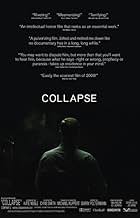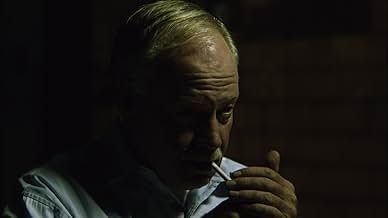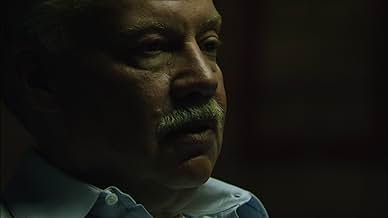Füge eine Handlung in deiner Sprache hinzuA documentary on Michael Ruppert, a police officer turned independent reporter who predicted the current financial crisis in his self-published newsletter, From the Wilderness.A documentary on Michael Ruppert, a police officer turned independent reporter who predicted the current financial crisis in his self-published newsletter, From the Wilderness.A documentary on Michael Ruppert, a police officer turned independent reporter who predicted the current financial crisis in his self-published newsletter, From the Wilderness.
- Regie
- Drehbuch
- Hauptbesetzung
Empfohlene Bewertungen
But the real element that grabs you is Smith's subject. Ruppert will be seen by some as a prophet and by others as a nutcase but he has a magnetism on screen that is undeniable. This ex-cop is well-spoken it is very obvious that he has given conferences and presentations as he begins to explain his theories.
The main point Ruppert is trying to get across is undeniable. Our planet has finite resources which will not be able to sustain our current way of life indefinitely. But Ruppert's actual discourse will never be confused with a green activist as he veers constantly into subjects such as peak oil, politicians and banks. Where Ruppert is more questionable is when he mixes opinions with facts.
Ruppert repeats that he is not a conspiracy theorist yet often acts like ones. He constantly cites people, studies and historic events that favors his point of views and ignores the rest. These are old techniques that have been used by countless gurus, theorists and leaders and Ruppert does it very effectively.
This mix of truth and speculation works because the part that is truth is monumentally percussive: We as a species will not be able to live this way forever.
Ruppert posits that the system is crashing down fast but you don't have to believe this to enjoy this documentary. He interprets all sorts of world events as symptoms and yet again, you can take it or leave it. He claims he has been shot at and that US presidents have taken a personal interest in him without offering any evidence and you can discard this. He makes a compelling argument that alternative energies we are exploring are not sustainable/viable in their actual form but you can choose to disagree. He lashes at the deficiencies of globalization and you could ignore that too.
What you can't ignore is that change will have to happen. Smith seems confident that the audience will make up their minds about Ruppert and his theories. You do not have to share Ruppert's quasi-apocalyptic vision of the future to have a great time watching this.
Despite the praise, Collapse is not without a few flaws. I wished more time had been devoted to questioning Ruppert's wilder claims. Shot at? When? Where? Who? I also thought Ruppert's angle was too focused on the US and would have loved to hear his opinion on China and a few other things.
But overall, this is a nice documentary with an air of political thriller to it. Whether it is academic or objective, is left for each viewer to decide.
Collapse is an amazing documentary that works on several levels. We'll start with the first: Ruppert's analysis of the world around us is stunningly bleak. Our entire civilization is based on oil. This is fact. All transportation requires oil in some form. All manufacturing (and civilization as we know it) is based on energy, which is finite, and requires some oil in some form. Building the resources to harvest ANY energy source requires manufacturing and transportation, which requires oil. Cultivating food requires energy to produce and transportation to get to your grocery store or home. Even if we discover some new energy source - algae, for example, which is not addressed in the film - all the components needed to harvest or utilize that energy are oil-based. Even if we invent cars without tires (which require 8+ barrels of oil to make, PER TIRE), the plastics and metals and components in those vehicles all require oil as either a direct ingredient or as an indirect part of the manufacturing.
Now imagine a world without oil. See where this is going?
This film, and Ruppert, go much further than that. Oil dependency is just the appetizer. Then we get to Peak Oil (or the Hubbert Peak). Then an economy based on floated, imaginary, (fiat) money. And so on. Ruppert builds his case with hysterically grim anecdotes and considerable authenticity. It's difficult to disagree with him precisely because he doesn't allow 'theory' or partisan/ideological opinion to seep into the discussion. The facts are accurate. The conclusions... are up to you.
Let's talk about the film-making itself: Chris Smith's film is shot 'bunker-style' for effect. It works. There are hardly any miscues in the technical aspects, and the editing style is absolutely riveting and never boring. As pure entertainment, if we can call it that, this film will absolutely command your attention for 80 minutes. The film does not subscribe - one way or another - to Ruppert. It just shows him as he is and allows you to draw your own conclusions. Right or wrong, Ruppert's quest to seek this knowledge and tell it to the world has subtly destroyed him. Collapse works on an intensely personal level, too. This film burns itself into the mind. It's point blank brilliant.
Others have noted a major flaw in Ruppert's arguments, including the filmmaker himself: Ruppert does not allow for miracles or human ingenuity in his apocalyptic scenarios. Ruppert has already decided we've passed the point of no return and is now looking to "build the lifeboat on the Titanic". When confronted about this directly, Ruppert's non-answer more or less says that he won't trust his fellow humans to think a way out of this. Ruppert has so expertly identified the problems, but he has no answers. All his "hope" is directed at ways to survive what's to come. Again, right or wrong, this man absolutely believes what he's saying and is absolutely terrified. You should be, too.
What's the way out? Well, I personally choose to believe the first part of Ruppert's argument and disregard the second. We are in trouble. But I choose to have faith in my fellow man, that we can "fix the Titanic" before it's too late. In the meantime, you must see this film. See it, soak it in, let it shake you, and tell your friends. Draw your own conclusions. Ruppert's role is to sound the warning. Perhaps if enough people see this film, someone out there will figure out what to do.
1. Ruppert discounts human ingenuity.
Having the benefit of the internet and the ability to research, you will find that even generous estimates tell us that any new power grid would take 30 years to establish. This means that if aliens came down to earth and gave us a perfect technology that required no input and had zero emissions it would still require a lot of oil and time to build an infrastructure to support it. The fact is oil has artificially increased our carrying capacity and when its gone, the excess population will go with it. The standard of living we all have come to demand will likely never return and certainly not for 7+ billion people. (not that we all have Hummers and flat screens now)
2. The San Francisco (chronicle?) lauds the moment Ruppert cries because they think he is lamenting the fate of humanity.
I think it's highly likely, and more compelling to look at the beginning of the documentary where he says he's lost his fiancé to betrayal and only has his dog, the beach, and this movement to get him by. He's crying because he thinks it will take a community to survive in the aftermath of the collapse, and he has no loved ones.
I would like to have had more info on a lot of his quotes but I guess that would likely take an 80 minute documentary into like 3 or 4 hours (which I wouldn't have minded). I might just buy some if his books to take a look to see how much more in depth he gets on most of the topics he covers in this documentary.
For me, watching this, it was like it's about time. What I mean by that is finally someone who doesn't come across as a street corner preacher or a bona fide nut. This guy is just talking about real issues that matter, or at least they should matter.
I would surely say - the most important movie for the 21st century man.
We live in a fairytale where everybody has a hope that the ''good'' will overcome the ''evil'' no matter how bad it is, because it will be better... in the end that's the way fairy tales end, don't they? The ugly truth is that no magical wonderland exists, there is only now and here and this movie shows you WHAT ACTUALLY IS NOW AND HERE.
Wusstest du schon
- WissenswertesAccording to director, Chris Smith, they initially agreed the primary subject was supposed to be the CIA's connections to drug smuggling within the Iran-Contra affair, specifically Ruppert's collaboration with Pulitzer Prize-winning reporter Gary Webb's mid-1990's investigative series, "Dark Alliance." But Ruppert didn't want to talk about the CIA. Instead, he wanted to talk about peak oil, and its critical implications for the future.
- Zitate
Michael Ruppert: It's kind of sad because we as a species have become so disconnected from the Earth. We don't have any real contact with the Earth. We don't have any sense of its functions, its feeling, its seasons, its timings.
- VerbindungenReferenced in Film Junk Podcast: Episode 235: TIFF Report, Part 1 (2009)
- SoundtracksCollapse
Performed by Karli Larsen, Didier Leplae, Joe Wong
Top-Auswahl
- How long is Collapse?Powered by Alexa
Details
Box Office
- Bruttoertrag in den USA und Kanada
- 46.964 $
- Eröffnungswochenende in den USA und in Kanada
- 7.800 $
- 8. Nov. 2009
- Weltweiter Bruttoertrag
- 46.964 $
- Laufzeit1 Stunde 22 Minuten
- Farbe
Zu dieser Seite beitragen



















